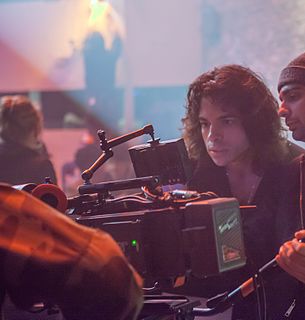A Quote by Camille Henrot
For me, it's really important that the experience of art is always something that is able to provoke strong emotion, an emotion that you feel in your heart or your stomach, but also that challenges the brain at the same time. It's an experience - physical and intellectual.
Related Quotes
One of the ultimate challenges of biology is to understand how the brain becomes consciously aware of perception, experience and emotion. But it is equally conceivable that the exchange would be useful for the beholders of art, for people who enjoy art, for historians, and for the artists themselves.
Don't cling to things, because everything is impermanent... But detachment doesn't mean you don't let the experience penetrate you. On the contrary, you let it penetrate you fully. That's how you are able to leave it...You're afraid of the pain, you're afraid of the grief... But by throwing yourself into these emotions, by allowing yourself to dive in, all the way, over your head even, you experience them fully and completely.You know what pain is. You know what love is. "All right. I have experienced that emotion. I recognize that emotion. Now I need to detach from that emotion for a moment.
Fight sequence to me isn't just about the athleticism. It so often is about what the emotion that is behind it and how willing you are to really, really challenge that emotion or really take that emotion to that place so you're feeling a certain intensity for the whole time when you're shooting the actual physical scenes.
That's what I like about the idea of the aesthetic experience, the idea of both enjoying looking at works of art and how they kind of talk to you, and also the process of making art, getting back to that idea of the aesthetic experience of making art is very important, It's another way of thinking. Instead of just using your brain, you're using your hands to think with. They're different connections, the brain that comes through the fingertips as opposed that comes through the eyes and ears.
A sentence is like a tune. A memorable sentence gives its emotion a melodic shape. You want to hear it again, say it—in a way, to hum it to yourself. You desire, if only in the sound studio of your imagination, to repeat the physical experience of that sentence. That craving, emotional and intellectual but beginning in the body with a certain gesture of sound, is near the heart of poetry.
Whereas life separates meaning from emotion, art unites them. Story is an instrument by which you create such epiphanies at will, the phenomenon known as aesthetic emotion...Life on its own, without art to shape it, leaves you in confusion and chaos, but aesthetic emotion harmonizes what you know with what you feel to give you a heightened awareness and a sureness of your place in reality.
The only way of expressing emotion in the form of art is by finding an "objective correlative"; in other words, a set of objects, a situation, a chain of events which shall be the formula for that particular emotion; such that when the external facts, which must terminate in sensory experience, are given, the emotion is immediately evoked.
This fact was something I also learned from this first novel that I needed personal experience to invent, to fantasize, to create fiction, but at the same time I needed some distance, some perspective on this experience in order to feel free enough to manipulate it and to transform it into fiction. If the experience is very close, I feel inhibited. I have never been able to write fiction about something that has happened to me recently. If the closeness of the real reality, of living reality, is to have a persuasive effect on my imagination, I need a distance, a distance in time and in space.
































